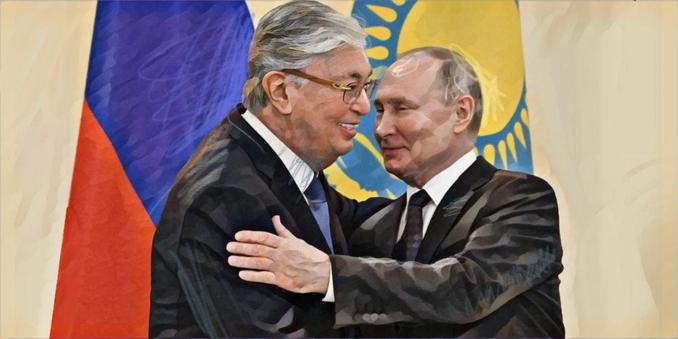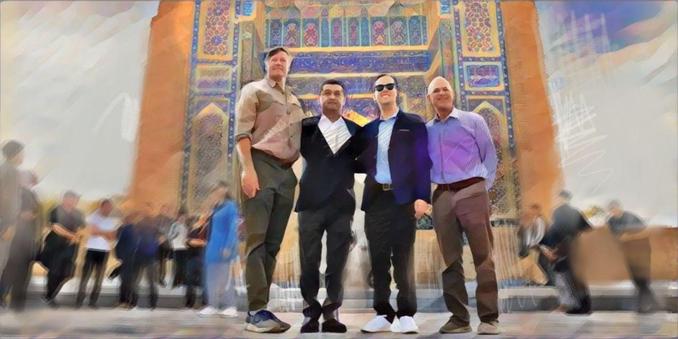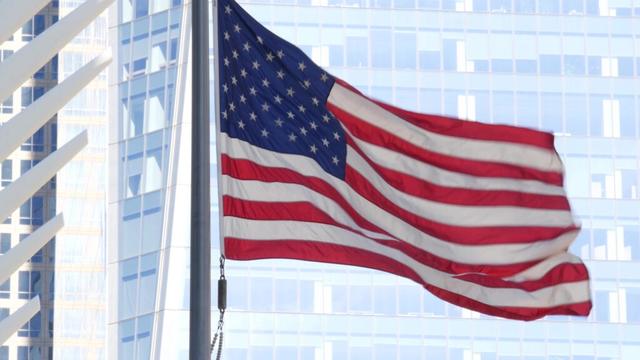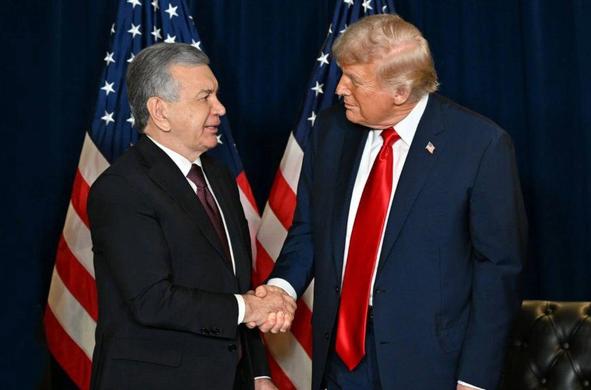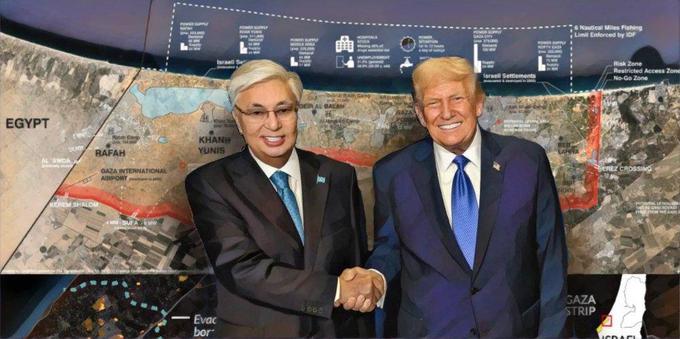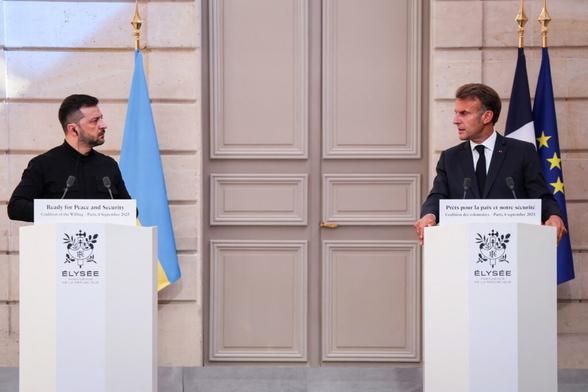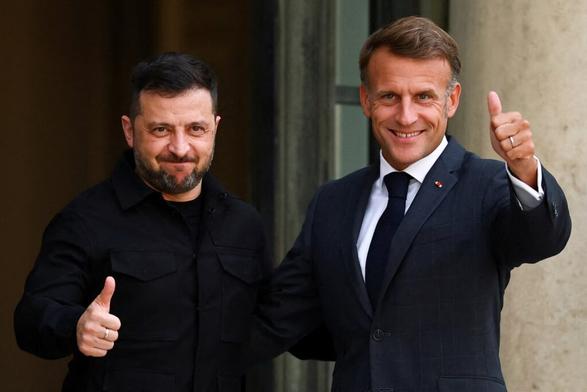Between Trump and Putin: Tokayev Emerges as a Regional Diplomatic Powerbroker
Gor and Landau Tour Central Asia Amid Rising Stakes
https://fed.brid.gy/r/https://timesca.com/gor-and-landau-tour-central-asia-amid-rising-stakes/
U.S. Special Envoy and Deputy Secretary of State to visit Central Asia
The Everywhere Insiders 8: U.S. Foreign Aid, Human Rights, and Global Security
Author(s): Scott Douglas Jacobsen
Publication (Outlet/Website): The Good Men Project
Publication Date (yyyy/mm/dd): 2025/07/21
Irina Tsukerman is a human rights and national security attorney based in New York and Connecticut. She earned her Bachelor of Arts in National and Intercultural Studies and Middle East Studies from Fordham University in 2006, followed by a Juris Doctor from Fordham University School of Law in 2009. She operates a boutique national security law practice. She serves as President of Scarab Rising, Inc., a media and security strategic advisory firm. Additionally, she is the Editor-in-Chief of The Washington Outsider, which focuses on foreign policy, geopolitics, security, and human rights. She is actively involved in several professional organizations, including the American Bar Association’s Energy, Environment, and Science and Technology Sections, where she serves as Program Vice Chair in the Oil and Gas Committee. She is also a member of the New York City Bar Association. She serves on the Middle East and North Africa Affairs Committee and affiliates with the Foreign and Comparative Law Committee. Tsukerman discusses global HIV funding cuts, ICE detention abuses, Myanmar’s monastery shelling, U.S.–Lebanon relations, Asian military drills, U.S.–Russia diplomacy, RFK Jr.’s health claims, and Sean Combs’ legal case, highlighting systemic failures, international law, and political hypocrisy in an insightful July 2025 interview. This interview was conducted on July 11, 2025.
Scott Douglas Jacobsen: We are back with the thoughtful Irena. We are focusing today on AP sources. The first topic concerns a warning from UNAIDS that millions of lives could be at risk if global HIV/AIDS funding is not sustained. Specifically, the concern is that if funding from major contributors such as the United States is reduced or withdrawn, the progress made in combating HIV could be reversed. This is especially relevant for countries in sub-Saharan Africa, but also has implications for the United States and other nations with vulnerable populations. What are your thoughts?
Irina Tsukerman: It does not appear likely that the U.S. will fully reinstate previously reduced global health aid without legal or legislative intervention. The administration at the time had claimed to be reorganizing the U.S. State Department. One of the stated goals included consolidating foreign aid functions—especially under USAID—though critics viewed this as a step toward reducing or eliminating specific humanitarian programs.
After meetings with African leaders, then-President Trump made general statements about cooperation but did not specifically commit to restoring humanitarian aid levels. He had also claimed that some foreign aid had been misused or lost to corruption, particularly through international agencies. Public health advocates widely criticized this statement.
There has been no significant change in that position. Available data show a concerning rise in HIV infections in certain regions, and setbacks in treatment access due to pandemic-related disruptions. However, this has not shifted policy priorities in the U.S. executive branch. At best, there might be limited public-private partnerships or coordination with NGOs to distribute targeted health resources. However, the scope and transparency of such efforts remain unclear.
There is also a lack of clarity about the disposition of previously allocated funds. For example, Congress had approved substantial budgets for HIV/AIDS relief through PEPFAR (the President’s Emergency Plan for AIDS Relief), a globally acclaimed initiative launched in 2003. Any redirection, delay, or reduction in these funds without Congressional oversight raises accountability concerns.
Congress should be more assertive in demanding transparency. Regardless of one’s political views on foreign aid, taxpayer funds allocated for life-saving programs deserve tracking and evaluation, not quiet defunding. Moreover, weakening U.S. humanitarian leadership undermines relationships with developing countries and global health security.
President Trump made clear that Africa was not a policy priority, except in cases where it intersected with strategic minerals or high-profile diplomatic gains. Ignoring the human toll of a resurgent HIV crisis could have global repercussions, including for the United States. The apparent lack of humanitarian concern is deeply troubling.
This moment also challenges critics of foreign aid, particularly conservative policymakers who argue that private charity should replace government assistance. If they genuinely believe this, now is the time to demonstrate that conviction by investing privately in effective health initiatives. Saving lives should transcend political ideology. If not now, when?
Jacobsen: Moving on to the following item: Mahmoud Khalil has reportedly been released from ICE detention. This has generated mixed reactions in the American press and public. Khalil, an Iraqi man who had been detained despite prior legal residence in the U.S., was reportedly held for a prolonged period due to an outdated deportation order. According to recent reports, he is now suing the federal government, seeking damages for wrongful detention. The amount claimed in the lawsuit is significantly high and involves allegations of constitutional violations, unlawful imprisonment, and procedural misconduct.
Tsukerman: Yes. This may be the least surprising news of the day. First of all, the courts ruled against the administration on this matter some time ago. The fact that it took so long to release Khalil after the initial court order—which clearly stated that, without a strong criminal case beyond the immigration issue, the U.S. government was violating his rights by detaining him—is deeply concerning. The delay demonstrates that the administration appears to treat judicial decisions as optional at best.
There has been ongoing tension between the executive branch and the judiciary, with the administration frequently claiming that judges who halted Trump’s orders were overreaching and interfering with executive authority. However, in reality, the executive branch is still constitutionally and legally bound, and it is the judiciary’s responsibility to ensure that citizens’ rights are respected and that the administration does not cause undue harm.
I believe it is fair to say that, without a clear and compelling criminal case establishing Khalil as a danger to the public, his rights were violated, particularly in being prevented from attending the birth of his child. The government is within its rights to pursue the immigration case if it believes he committed fraud on his application. They can argue he is subject to deportation on that basis. However, none of that justifies holding him in an ICE facility indefinitely.
So far, the administration has failed to make a strong case that he poses an actual threat. They made a brief claim that he supported ideologically extreme groups, which may factor into a deportation hearing. Still, they have not demonstrated that he is either a flight risk or a danger to the public. That failure is what is generating negative press and could jeopardize other immigration enforcement cases. It is politically damaging. Opponents can now point to this as a failure of the national security rationale, rallying support from groups on the political left that oppose the administration’s immigration stance. This situation will not help the White House. They should reconsider their handling of such cases.
Jacobsen: Now, moving on—the twenty-third death has been reported following the shelling of a Buddhist monastery in Myanmar. Can you provide a broader context? Are there any protections under humanitarian or international law for religious sites like this?
Tsukerman: Yes. Religious structures are considered civilian infrastructure and are protected under international humanitarian law. They are not legitimate military targets unless they are being used for military purposes, which must be established. In this case, there is no evidence that the monastery was being used for any military activity. The Myanmar military has not commented on the incident. The official death toll is currently at 23 but may rise to as many as 30, including children and other civilians.
The military claims it targets only legitimate military threats—such as local resistance and independence groups—but they have not provided any explanation for this specific incident. It is unclear whether they believed rebels were hiding inside, whether it was an error, or if civilian casualties were disregarded. Based on available information, this appears to be an unjustifiable strike. At a minimum, the government should clarify the circumstances and compensate the victims. If this was a deliberate attack or a case of reckless disregard, they must be held accountable under international law.
Jacobsen: Next topic—the president of Lebanon has revealed the country’s official position on relations with Israel. The general message: there are currently no plans to reestablish diplomatic ties.
Tsukerman: Essentially, he stated that Lebanon is at peace with Israel, but not in a state of normalization. That likely implies some non-aggression pact or tacit understanding, similar to the arrangement Israel had with Hafez al-Assad in Syria before Bashar al-Assad’s rise to power. That earlier arrangement involved a commitment not to attack each other’s territory, resulting in a very cold, distant peace defined more by non-engagement than by actual cooperation.
However, I do not believe such an arrangement can be fully guaranteed by Lebanon, given that Hezbollah remains a powerful military and political force in the country, mainly outside the control of the central government. While it is unlikely that Hezbollah will escalate tensions in the near term—due to the significant damage inflicted by Israeli airstrikes and the current political fragility of their patron, Iran—there is always the potential for renewed conflict in the coming years as they regroup and rebuild.
Unless Hezbollah is wholly removed from Lebanon’s political and military spheres and is fully disarmed, the Lebanese government cannot credibly guarantee peace to Israel. Frankly, any agreement reached while the government is heavily influenced or partially controlled by a designated terrorist organization is questionable at best. On a tactical level, a non-aggression arrangement is better than nothing. However, it is not a pleasant outcome for those who had hoped Israel and Lebanon would join the Abraham Accords framework.
Given Lebanon’s internal instability, however, a complete normalization agreement was always extremely unlikely. This latest development is likely the best outcome under current conditions, though even that is debatable.
Jacobsen: Let us turn to the joint aerial drills conducted by South Korea, the U.S., and Japan. This is broadly seen as a demonstration of strength directed at North Korea. For civilians without geopolitical or military expertise—or without a deeper understanding of the psychological strategies required when dealing with autocratic leaders—it may not seem very clear. People might ask, “Why are you flying jets around—what is the point?” However, there is, in fact, a point: to project strength in a way that resonates with leaders who only respond to displays of force. So, without diving too far into the psychology, what is the relevance of these drills? Why is this a strategically sound joint effort?
Tsukerman: Most importantly, it is a display of unity. It signals that the U.S. remains actively engaged in the Indo-Pacific region, that it stands firmly with its allies, and that it will oppose any aggression. These military exercises are not provocations; they are standard, pre-planned drills. However, they serve a crucial function: they demonstrate that South Korea, Japan, and the United States share a unified sense of purpose in the face of external threats.
There are indeed explicit threats. North Korea has repeatedly made hostile statements and tested missiles capable of striking all three countries, though South Korea and Japan are the most immediate targets. China, too, has issued warnings—particularly to Japan—threatening military retaliation if it were to support Taiwan in any meaningful way. In recent years, China has violated Japanese airspace, harassed Japanese pilots, and escalated tensions in the region.
These joint aerial drills, then, can be understood as a measured response to both North Korean and Chinese aggression. If China wants a reduced U.S. presence in the region, it must first stop threatening its neighbours.
Jacobsen: So, Senator Rubio says the U.S. and Russia have exchanged new ideas for Ukraine peace talks. I will not include a parenthetical laugh, but according to him—and, of course, he is not the Secretary of State—there are discussions about new proposals being exchanged.
Tsukerman: The next time Lavrov expresses a genuinely new idea, it will be the first. So far, he has done nothing but repeat the same mendacious talking points crafted by the Kremlin. I do not know what exactly could be proposed that Ukraine would find acceptable, unless we are talking about the beginning of a Russian withdrawal from occupied territories or a firm commitment to stop targeting civilians.
Without that, I do not see why any of these so-called new ideas would matter to anyone. We will have to wait and see what is presented. Still, I suspect the announcement may be reframed before it is formally articulated—perhaps to make it more palatable to Western audiences. It is also entirely possible that Russia is attempting to preempt further U.S. assistance to Ukraine, including even defensive aid.
According to President Zelensky, that aid has only recently resumed. The whole situation is scandalous because the assistance being discussed is defensive—it is not meant to help Ukraine launch major offensives but rather to protect civilians from ongoing, illegal, and immoral Russian attacks, which have been escalating.
So, the decision to allow Poland’s older Patriot missiles to be transferred to Ukraine is not some grand humanitarian gesture. It is the bare minimum the administration should have done continuously from the beginning. Punishing civilians because of political disagreements between the White House and President Zelensky is reprehensible. It only empowers Russia to maintain a perception of strength, despite its military weakness, which is precisely why it continues to target civilian populations.
Jacobsen: RFK Jr. is promoting a company under the slogan “We Make America Work Healthy.” That is his sincere conviction, though the evidence behind that claim appears to be severely lacking and misleading. Unfortunately, this promotion will cause more harm than good. The company in question produces ultra-processed meals. What are your thoughts on this situation?
Tsukerman: It seems to me that this is a combination of a potentially sincere conspiratorial mindset—however harmful—and outright hypocrisy on the part of RFK Jr. There is no way he was unaware of what the company was selling. Moreover, this is not the first time he has promoted products—presumably for money—that he would not consume himself or consider healthy.
We can recall the incident involving his endorsement of French fries, despite his public image of eating only extremely healthy foods. However, when a quick profit is available, he appears willing to promote virtually anything, including items that are blatantly unhealthy. This raises a serious question: if RFK Jr. truly cares about Americans’ health, why is he not using his platform to promote genuinely healthy food? Surely, there are companies focused on nutrition and public health that would collaborate with him. Unless his reputation is now so tarnished that only fringe companies are willing to work with him.
Regardless, given his political position and public influence, he should not be promoting any products at all, healthy or otherwise. It is also deeply hypocritical. While he claims to prioritize U.S. health, the measles epidemic in the United States is reaching record highs. He has spent years casting doubt on vaccines—including the measles vaccine—and we are now seeing the consequences. There have already been deaths, and the illness presents serious health risks, particularly for unvaccinated adults.
Even individuals who have been vaccinated, especially those with weakened immune systems or incomplete immunization, can still be at risk. Measles is not a trivial disease. The fact that he has been promoting conspiracy theories against life-saving vaccines is grossly irresponsible.
Jacobsen: Now, for the last topic—not strictly geopolitics, but it has drawn significant international attention. This particular case aligns with a pattern seen in the Jeffrey Epstein case, Larry Nassar, the Catholic clergy abuse scandals, Orthodox community abuse scandals, civic institutional cover-ups, and others.
Sean “Diddy” Combs is currently in custody and awaiting sentencing. He was acquitted of sex trafficking and racketeering charges but was convicted on other related offences. He narrowly avoided a life sentence.
Jacobsen: What are your overall thoughts on the implications of this case, and, separately, any insight into the upcoming release of the TV documentary Price of Oil?
Tsukerman: Here is the issue: it appears the prosecution mishandled how they presented the charges during the trial. As a result, a sex offender and a very dangerous individual may soon be released back into society. While his reputation has indeed suffered from the trial, and many outside the courtroom may be convinced of his guilt regarding the more serious accusations, the fact remains that he was acquitted of some of the most disturbing charges. He may now try to rehabilitate his public image, much like O.J. Simpson did—a horrifying possibility.
Ironically, he was convicted on charges related to prostitution. That raises a more profound moral contradiction. Suppose we are convicting people of prostitution but not of sex trafficking. In that case, we are implying that the sex was consensual and transactional. So why is it a crime? On the other hand, if there are credible accusations of trafficking and exploitation, and women are being victimized, how is it possible that the person facilitating those services is not held accountable for trafficking?
The case, in my view, is riddled with legal inconsistencies and serious ethical concerns. Moreover, unfortunately, these kinds of contradictions are not rare—they create openings for people like Combs, or previously Epstein, to abuse power and manipulate the legal system. Epstein, of course, never faced full justice. He died in custody before sentencing. Combs, meanwhile, will serve time—but not on the most serious allegations. Moreover, that is devastating for survivors who were never fully heard or vindicated. Any final thoughts on this week’s developments?
Tsukerman: As always, it has been a busy week for news. However, U.S. national security is in a precarious position, especially considering that some of those in charge of it do not appear to have sound judgment.
One glaring example is the hiring of serial liar Sergei Gorakhovsky—also known as Sergei Gor—who reportedly concealed his identity for unclear reasons. Despite this, he was placed in a critical role as head of the White House Personnel Office, responsible for staffing decisions. That raises serious concerns about vetting, accountability, and the broader integrity of administrative leadership.
Jacobsen: Thank you for the opportunity and your time, Irina.
Last updated May 3, 2025. These terms govern all In Sight Publishing content—past, present, and future—and supersede any prior notices. In Sight Publishing by Scott Douglas Jacobsen is licensed under a Creative Commons BY‑NC‑ND 4.0; © In Sight Publishing by Scott Douglas Jacobsen 2012–Present. All trademarks, performances, databases & branding are owned by their rights holders; no use without permission. Unauthorized copying, modification, framing or public communication is prohibited. External links are not endorsed. Cookies & tracking require consent, and data processing complies with PIPEDA & GDPR; no data from children < 13 (COPPA). Content meets WCAG 2.1 AA under the Accessible Canada Act & is preserved in open archival formats with backups. Excerpts & links require full credit & hyperlink; limited quoting under fair-dealing & fair-use. All content is informational; no liability for errors or omissions: Feedback welcome, and verified errors corrected promptly. For permissions or DMCA notices, email: scott.jacobsen2025@gmail.com. Site use is governed by BC laws; content is “as‑is,” liability limited, users indemnify us; moral, performers’ & database sui generis rights reserved.
#globalSecurity #humanRightsAdvocacy #internationalDiplomacy #IrinaTsukermanInterview #USForeignAid
Mirziyoyev Secures Spotlight During U.S. Visit
https://fed.brid.gy/r/https://timesca.com/mirziyoyev-secures-spotlight-during-u-s-visit/
Kazakhstan Backs Trump’s Gaza Peace Initiative
https://fed.brid.gy/r/https://timesca.com/kazakhstan-backs-trumps-gaza-peace-initiative/
Tokayev in New York: $100B U.S. Investment Push Boosts Kazakhstan Ties
26 Nations Ready to Send Troops to Ukraine
Macron announces 26 nations ready to send peacekeeping troops to Ukraine after ceasefire, strengthening diplomatic pressure on Russia.https://www.olamnews.com/world/europe/1435/26-nations-ready-send-troops-ukraine/

Livio Andrea Acerbo (@AcerboLivio) on X
Global Shifts & Tensions Unfold | August 29, 2025 World Update **Hashtags:** #GlobalNews, #UNIFILExit, #InternationalDiplomacy, #MiddleEastUpdates, #EarthquakePakistan **Description:** Stay informed with today’s comprehensive global update for August 29, 2025! Discover the
